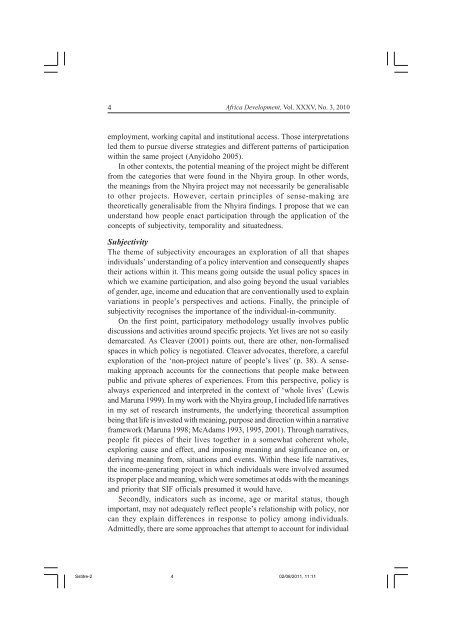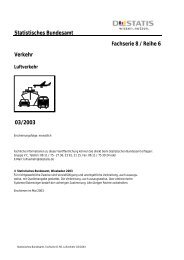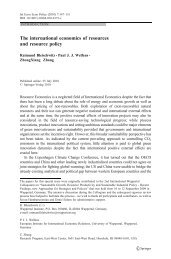lieux (publics) de ville » par les mots ou comment les murs - Index of
lieux (publics) de ville » par les mots ou comment les murs - Index of
lieux (publics) de ville » par les mots ou comment les murs - Index of
Create successful ePaper yourself
Turn your PDF publications into a flip-book with our unique Google optimized e-Paper software.
4 Africa Development, Vol. XXXV, No. 3, 2010<br />
employment, working capital and institutional access. Those interpretations<br />
led them to pursue diverse strategies and different patterns <strong>of</strong> <strong>par</strong>ticipation<br />
within the same project (Anyidoho 2005).<br />
In other contexts, the potential meaning <strong>of</strong> the project might be different<br />
from the categories that were f<strong>ou</strong>nd in the Nhyira gr<strong>ou</strong>p. In other words,<br />
the meanings from the Nhyira project may not necessarily be generalisable<br />
to other projects. However, certain princip<strong>les</strong> <strong>of</strong> sense-making are<br />
theoretically generalisable from the Nhyira findings. I propose that we can<br />
un<strong>de</strong>rstand how people enact <strong>par</strong>ticipation thr<strong>ou</strong>gh the application <strong>of</strong> the<br />
concepts <strong>of</strong> subjectivity, temporality and situatedness.<br />
Subjectivity<br />
The theme <strong>of</strong> subjectivity enc<strong>ou</strong>rages an exploration <strong>of</strong> all that shapes<br />
individuals’ un<strong>de</strong>rstanding <strong>of</strong> a policy intervention and consequently shapes<br />
their actions within it. This means going <strong>ou</strong>tsi<strong>de</strong> the usual policy spaces in<br />
which we examine <strong>par</strong>ticipation, and also going beyond the usual variab<strong>les</strong><br />
<strong>of</strong> gen<strong>de</strong>r, age, income and education that are conventionally used to explain<br />
variations in people’s perspectives and actions. Finally, the principle <strong>of</strong><br />
subjectivity recognises the importance <strong>of</strong> the individual-in-community.<br />
On the first point, <strong>par</strong>ticipatory methodology usually involves public<br />
discussions and activities ar<strong>ou</strong>nd specific projects. Yet lives are not so easily<br />
<strong>de</strong>marcated. As Cleaver (2001) points <strong>ou</strong>t, there are other, non-formalised<br />
spaces in which policy is negotiated. Cleaver advocates, therefore, a careful<br />
exploration <strong>of</strong> the ‘non-project nature <strong>of</strong> people’s lives’ (p. 38). A sensemaking<br />
approach acc<strong>ou</strong>nts for the connections that people make between<br />
public and private spheres <strong>of</strong> experiences. From this perspective, policy is<br />
always experienced and interpreted in the context <strong>of</strong> ‘whole lives’ (Lewis<br />
and Maruna 1999). In my work with the Nhyira gr<strong>ou</strong>p, I inclu<strong>de</strong>d life narratives<br />
in my set <strong>of</strong> research instruments, the un<strong>de</strong>rlying theoretical assumption<br />
being that life is invested with meaning, purpose and direction within a narrative<br />
framework (Maruna 1998; McAdams 1993, 1995, 2001). Thr<strong>ou</strong>gh narratives,<br />
people fit pieces <strong>of</strong> their lives together in a somewhat coherent whole,<br />
exploring cause and effect, and imposing meaning and significance on, or<br />
<strong>de</strong>riving meaning from, situations and events. Within these life narratives,<br />
the income-generating project in which individuals were involved assumed<br />
its proper place and meaning, which were sometimes at odds with the meanings<br />
and priority that SIF <strong>of</strong>ficials presumed it w<strong>ou</strong>ld have.<br />
Secondly, indicators such as income, age or marital status, th<strong>ou</strong>gh<br />
important, may not a<strong>de</strong>quately reflect people’s relationship with policy, nor<br />
can they explain differences in response to policy among individuals.<br />
Admittedly, there are some approaches that attempt to acc<strong>ou</strong>nt for individual<br />
Sstitre-2 4<br />
02/08/2011, 11:11








